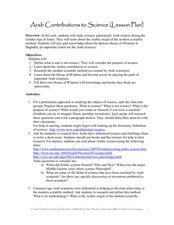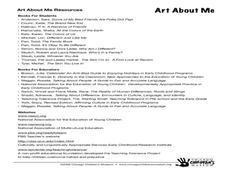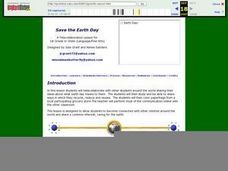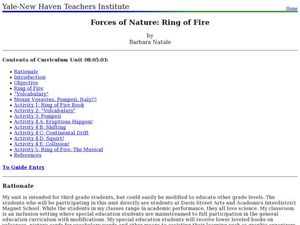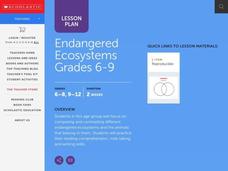Curated OER
Arab Contributions to Science
Learners study Arab science and the origin of the modern scientific method. In this science lesson plan students fill in their own House of Wisdom books.
Curated OER
Presenting Powerful Outlines for Science Fair Reports
Middle schoolers examine and reflect on the role of science reports in the larger scientific community and become familiar with one scientist's experience preparing a report. They identify key points to build a strong science report and...
Curated OER
Snowflake Bentley
Students read books and draw pictures about what a scientist does. In this scientist lesson plan, students brainstorm together of all the things a scientist does.
Curated OER
Art About Me- The Skin You Live In
Learners read the text The Skin You Live In by Michael Tyler. In this literacy lesson, students discuss the characters in the text and the various shades of skin they observed on each page. Learners read the beautiful descriptions of the...
Curated OER
Spiders
Students read books and make art projects dealing with spiders. In this spiders lesson plan, students learn about the different characteristics of spiders through listening, answering questions, and making spiders.
Curated OER
Astronauts Build Space Station Addition
Young scholars read a story called Astronauts Finish Building Space Station Addition and answer vocabulary and comprehension questions about it. In this space station lesson plan, students respond to literature by answering questions,...
Curated OER
Zoo-Goers Ready to Greet Baby Panda
The Smithsonian's National Zoo, also known as the Washington Zoo, is one of the oldest zoos in the United States. Youngsters read and discuss a news article about Tai Shan, baby panda that was one of the zoos most famous residents. They...
Curated OER
Very Hungry Caterpillar
Students explore the life cycle of a butterfly. In this life cycle lesson plan, students read the book the Very Hungry Caterpillar. Students use this book throughout the year to create a year round bulletin board showing the stages of...
Curated OER
Save the Earth Day
First graders tellacollaborate with other students around the world sharing their ideas about what earth day means to them. They share ways in which they recycle, reduce and reuse.
Curated OER
Rachel's Life is in a Hole
Explore how lack of access to water impacts peoples' lives in poor countries. Through text reading and discussion, middle schoolers are presented with the story of a young girl who lives and functions with limited water resources. They...
Curated OER
Forces of Nature: Ring of Fire
Third graders will research the Ring of Fire and be able to share their findings with their partner. They will also demonstrate volcanic eruptions using a baking soda and vinegar volcano model. Then they will discover how continental...
Curated OER
Asthma and Allergies
Your health class reads two biographical stories: one about a girl who has allergies and the other about a girl who has asthma. They watch a quick cartoon on the KidsHealth website about immunity and take the related online quiz. You...
Curated OER
Medical Explorer
After reading a case study, pupils will explore possible diagnoses, assessment, and treatment plans. Finding the definitions to medical vocabulary and sorting through patient history, they will begin to understand the process of...
Baylor College
What's That Food?
Get things cooking with the first lesson in this series on the science of food. Working in small groups, young scientists make and record observations about different mystery foods. These descriptions are then shared with the class and...
Curated OER
Exploring Learned and Innate Behavior
Students explore the differences between learned and innate behavior among humans and monkeys. They complete an assignment and read articles about two studies, which used similar test methods to show that infants and monkeys share an...
Curated OER
Endangered Ecosystems
Reading comprehension and note-taking skills are practiced as young ecologists embark on this journey. Explorers visit a website where they will read about three ecosystems that are in danger. They use interactive programs to build a...
Curated OER
Water and Ice
Students will observe, measure and describe the phase changes of ice. For this science lesson plan, students observe ice as it changes phases. Qualaitative notations made by individual students will be shared and compared.
University of California
Hot! Hot! Hot!
Calories are not tiny creatures that sew your clothes tighter every night, but what are they? A science activity, presented at multiple levels, has learners experiment with heat, heat transfer, and graph the function over time. It also...
University of Colorado
Looking Inside Planets
All of the gas giant's atmospheres consist of hydrogen and helium, the same gases that make up all stars. The third in a series of 22, the activity challenges pupils to make scale models of the interiors of planets in order to...
Curated OER
Dirt Babies
Dirt babies are an excellent way to show young botanists the plant life cycle. They explore the functions and industry behind grasses before growing some of their own. Use the informational text here and consider implementing some...
Polar Trec
Swan Savvy
Just like so many other birds, swans migrate during the cold winter months. Your class can gain a better understanding of migration and bird life as they act out some of the activities common to the tundra swan. They make a nest, sit on...
Curated OER
Bering Sea Buffet - A Foodweb Activity
Life in the Bering Sea, food webs, and the ocean ecosystem are introduced with a map activity. The lesson starts as kids explore maps and images of the Bering Sea, then it kicks into high gear as they start to discuss the types of...
Curated OER
Bouncing Bubbles
Students complete a variety of activities exploring the joys and science of bubbles. They listen to the book "Bubbles Bubbles" by Mercer Mayer, create a bubble picture using Kid Pix, and explore blowing bubbles. Students experiment...
National Earth Science Teachers Association
The Earth Scientist Project
Pairs of learners choose an earth scientist from an extensive list. They collect information by researching online or in books about the childhood, education, and major contributions made by their chosen scientist. When they present...


